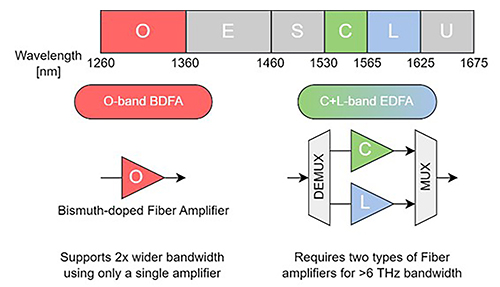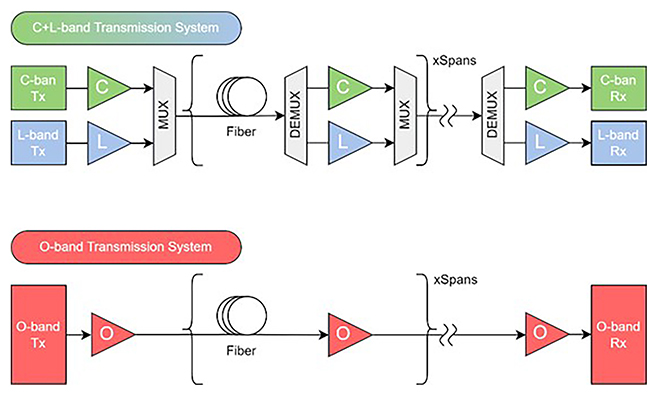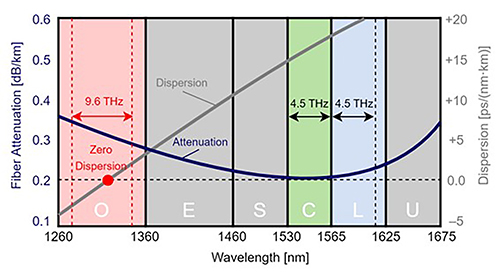 Print
Print
- Advanced Technology Laboratories
Utilization of ultrawide bands to increase the capacity of optical fiber communication: The world’s first successful O-band coherent high-density wavelength division multiplexing transmission experiment
~With this method, equipment configuration is reduced to half that of the conventional configuration. In addition, power consumption for inter-data center communication is expected to be reduced.~
May 18, 2023
KDDI Research, Inc.
Furukawa Electric Co., Ltd.
OFS Laboratories, LLC
KDDI Research, Inc. (headquartered in Fujimino-shi, Saitama; President: Hajime Nakamura; hereinafter “KDDI Research”) and OFS Laboratories, LLC (headquartered in the United States; hereinafter “OFS”), a group company of Furukawa Electric Co., Ltd. (headquartered in Chiyoda-ku, Tokyo; President: Hideya Moridaira; hereinafter “Furukawa Electric”), have successfully completed the world’s first (Note 1) experiment using ultrawideband optical fiber amplifiers, which simultaneously amplify 9.6 THz in the O-band (wavelength range of 1260 nm to 1360 nm) for use with current optical fibers, i.e., approximately twice that of the C-band (1530 nm to 1565 nm) or L-band (1565 nm to 1625 nm) most commonly used in optical communication. Using an ultrawideband optical fiber amplifier (bismuth-doped fiber amplifier; hereinafter BDFA), the coherent dense wavelength division multiplexing (hereinafter DWDM (Note 2)) transmission experiment was successfully conducted using signals with a capacity exceeding 40 Tbps. In this experiment, KDDI Research developed the O-band coherent DWDM transmission technology, while OFS developed ultrawideband BDFA.
This result enables optical fiber communication to be used for large-capacity communication between data centers, which are often connected over distances of up to 80 km. Moreover, the power consumption of this communication is also expected to be reduced compared to standard approaches.
■ Background
Beyond 5G/6G, we assume that a greater quantity of more diverse data will flow through networks than at present, and it is essential to further expand the transmission capacity of optical fiber communication in order to support networks. Current optical fiber communication systems mainly use the C-band and L-band wavelength ranges, but to further increase the capacity of optical fiber communication, the number of wavelength bands that can be utilized should be increased.
In this context, the use of the O-band has gained attention. Optical signal transmission using the C-band and L-band requires heavy-load digital signal processing to compensate for signal distortion due to wavelength dispersion (Note 3). However, wavelength distortion has a smaller impact on the O-band, a wavelength band near-zero dispersion, thus reducing the load on digital signal processing and improving energy efficiency.
In contrast, coherent transmission technology uses the optical phase in addition to the intensity of light to enable high-speed and large-capacity communication. However, the optical phase is easily distorted by other optical signal components, and this effect is stronger closer to zero-dispersion wavelengths. The nonlinear noise created by this phenomenon is generally difficult to remove with digital signal processing techniques, reducing the overall performance of the system. Therefore, it is difficult to apply coherent transmission technology in the O-band.
■ Content
【Results】
In this experiment, KDDI Research developed the O-band coherent DWDM transmission technology, while OFS developed ultrawideband BDFA. The combination of these technologies has enabled coherent transmission in the O-band by minimizing the effects of nonlinear noise.
Through this experiment, it was confirmed that the O-band coherent DWDM transmission system can achieve the same or higher wideband and high-capacity transmission with lower power consumption, while using only half of the conventional wideband transmission equipment configuration that uses C+L bands.
1)O-band coherent DWDM transmission technology
The minimization of nonlinear noise in the O-band was achieved by appropriately setting the optical transmission power for each densely multiplexed wavelength signal. This process has demonstrated the possibility of multiplexing up to 190 wavelength channels with a high throughput of over 240 Gbps on average, minimizing the effects of nonlinear noise, even when the processes of transmitter-side signal compensation and receiver-side wavelength dispersion compensation are omitted. As a result, O-band coherent DWDM transmission with a large capacity of over 40 Tbps has been made possible.
2)Ultrawideband BDFA (Figure 1)
Compared to EDFA (erbium-doped fiber amplifier), i.e., the industry standard for optical fiber amplifiers that can amplify only the C-band or L-band, BDFA can provide the same or better amplification with better noise figures over the entire O-band (which is wider than the C-band and L-band combined). This experiment showed that an ultrawide bandwidth comparable to the C+L band can be achieved by amplifying coherent DWDM signals over 9.6 THz in the O-band.

Figure 1. Bismuth doped optical fiber amplifier (BDFA).
O-band coherent DWDM transmission systems are distinguished by their ability to reduce the necessary equipment configuration (Figure 2) and their use of wavelength bands with near-zero dispersion, which significantly reduces digital signal processing related to wavelength dispersion (Figure 3). Both of these characteristics are expected to reduce total power consumption.
In terms of the equipment configuration, compared to the conventional method that requires two or more optical fiber amplifiers, this system can provide a large transmission capability with an energy consumption efficiency equivalent to that of a single optical fiber amplifier. The slimmed-down design also saves space.
In addition, the scale of electronic circuits may be significantly reduced because the digital signal process for signal correction on the transmitter side and wavelength dispersion compensation on the receiver side can be reduced. The reduction in processing time is also expected to result in decreased delays.

Figure 2. The configuration of 9.6-THz class wide bandwidth optical fiber transmission.

Figure 3. Transmission loss and wavelength dispersion in the O-band.
Coherent DWDM transmission systems are capable of high-speed and large-capacity optical fiber transmission and have been previously employed for long-distance transmission sections, such as those connecting cities. However, in recent years, they have also been applied to short- and medium-distance communication paths, such as between data centers requiring high-capacity transmission. Our newly developed BDFA makes it possible to eliminate the need to install a wavelength multiplexer, which is otherwise required for each optical amplifier in conventional broadband transmission configurations. Thus, the increase in the transmission loss of transmission lines can be suppressed, and the advantages of the O-band including low wavelength dispersion and excellent energy efficiency can be utilized in short- and medium-haul transmission sections.
【Future Outlook】
We expect that by leveraging the results of this experiment, the potential transmission capacity of existing optical fibers can be maximized. In the future, various technological developments will be required for the practical application of the O-band coherent DWDM transmission system. We expect that this achievement will accelerate the development of transmitters and receivers, optical fiber amplifiers, and digital signal processing algorithms.
Some of the research and development results are from Project JPNP20017, which is entrusted to KDDI Research by the New Energy and Industrial Technology Development Organization (NEDO), Japan.
These results were reported as a postdeadline paper (Note 4) for OFC2023 (Optical Fiber Communication Conference & Exposition), the world’s largest international conference on optical communication technology, held from March 5, 2023 to March 9, 2023.
This experiment will be introduced at the KDDI Research booth at “Wireless Japan 2023 x Wireless Technology Park 2023,” which will be held at Tokyo Big Sight (Koto-ku, Tokyo) from May 24, 2023 to May 26, 2023.
(Note 1) The world’s first successful coherent dense wavelength division multiplexing transmission experiment using a bandwidth of 9.6 THz in the O-band (as of May 18, 2023, conducted by KDDI Research, Inc.).
(Note 2) Coherent dense wavelength division multiplexing (DWDM) transmission technology: Coherent transmission technology is a method of transmitting a larger volume of data than conventional intensity-modulation direct-detection technology by utilizing the wave properties of light as well as the light intensity. DWDM is a method of densely multiplexing wavelengths in WDM technology, which increases the transmission capacity of optical fibers.
(Note 3) Wavelength dispersion: A phenomenon in which the speed of light waves propagating through an optical fiber differs depending on the wavelength.
(Note 4) Postdeadline papers: Papers accepted after the general paper submission deadline (postdeadline). During the conference, the selection of papers is conducted, and only research papers that receive a high evaluation will be reported.
※The information contained in the articles is current at the time of publication.Products, service fees, service content and specifications, contact information, and other details are subject to change without notice.